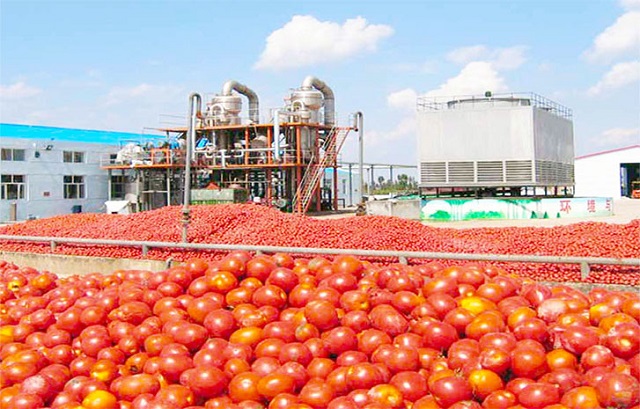Multinational culinary product manufacturer GBfoods has commissioned the recently completed tomato processing factory in northwestern Nigeria, the company said Monday. The ₦20 billion plant, located in Kebbi State, was built in partnership with the Central Bank of Nigeria, Kebbi State Government, and the Emirate of Yauri.
“The commissioning of this processing factory is a great milestone for us,” said Vincent Egbe, Country Manager of GBfoods Nigeria, owners of popular brands Gino, Bama, and Jago. “It further demonstrates the company’s commitment towards helping Nigeria achieve its food security ambitions, in this case, of self-sufficiency in tomato concentrate production.”
The Kebbi factory has the largest single tomatoes farm in Nigeria and is the second-largest in the country, as well as the only fully backward integrated plant in the West African region, GBfoods said. It is poised to become the largest fresh tomatoes processing factory in Sub-Saharan Africa when all phases of the project are concluded.
According to the company, investment in the “world-class” factory and adjoining farm includes drip irrigation and fertigation infrastructure, greenhouses, seed planting robots, incubation chambers, and a plethora of agricultural machinery.
The farm is to serve a dual purpose – producing industrial tomatoes in the dry season and soya beans in the raining season. Meanwhile, the tomato factory will convert fresh tomatoes into tomato concentrate used for producing Gino Tomatoes Paste and Tomato Pepper Onion Paste while the soya bean will be used to process soya-bean oil, which is a critical ingredient for the Bama and Jago Mayonnaise.
In terms of impact, the project created over 1,000 jobs including 500 farming jobs, 150 factory jobs, and 150 construction jobs, the company said, also supporting host communities by providing and maintaining 16 boreholes of drinking water, a first for some of the surrounding villages. GBfoods also engaged many smallholder farmers as out-growers, training them on good agricultural practices. It provided them with tomatoes seedlings, agrochemicals, and various equipment such as water pumps and hose pipes, enabling the farmers to access water in the dry season.
The factory is fully backwardly integrated into the company’s farm and dedicated out-growers, GBfoods said. In the coming tomatoes season, the plant will source most of its raw material from over 5,000 smallholder farmers/out-growers who will grow fresh tomatoes on their own farms and from GBfoods’ owned and operated farm. Over the past three years, GBfoods has worked with smallholder out-growers in Kaduna, Katsina, and Kebbi States to boost their incomes by providing seedlings, fertilizers, training, and irrigation pumps, as well as free plastic crates further to reduce post-harvest losses, according to Egbe.
“We will continue to work with the Federal Government towards food security and local production and processing of fresh tomatoes,” Egbe said further at the factory opening. “The company is dedicated to reducing pre and post-harvest losses and also developing the value chain so as to improve revenue streams for tomato farmers.”
The team of extension workers, consultants, and agronomists at GBfoods are ensuring that the Nigerian farmers also benefit from the technology transfer of the company’s best practices and know-how built through over 40 years of successful tomato operations in Italy and Spain, GBfoods Africa CEO Vicenç Bosch said.
Additional land is expected to be cleared and prepared in September for the farming season of October 2021. The expansion will be similarly accompanied by an upgrade in the factory’s capacity, further creating new jobs, the company said. “GBfoods is working with the Federal Government of Nigeria and the CBN to make Nigeria not only a shining example in food security but also to become the food basket of Africa,” adds Egbe.
Bosch commended the Federal Government for encouraging and supporting GBfoods to engage with CBN, Ministries, Departments, and Agencies to ensure the successful completion of the factory. He also expressed his gratitude to the Federal Ministry of Industry Trade and Investments, Federal Ministry of Agriculture & Rural Development, Kebbi State Government, and the Ngaski Local Government Authorities for their tremendous support towards the actualization of the project.
Meanwhile, Egbe thanked the Buhari administration, the Kebbi Governor, His Excellency Governor Atiku Abubakar Bagudu, the CBN Governor, Mr. Godwin Emefiele; and the Emir of Yauri, Dr. Muhammad Zayyanu Abdullahi for working tirelessly to create an enabling investment environment for GBfoods backward integration project in tomatoes.
GBfoods has a wide range of quality well-established brands in Nigeria such as Gino, Bama, and Jago, under which it manufactures a wide range of quality products that make the daily lives of many African families easier. Products under its brands include Gino Tomatoes Mix; Gino Pepper Onion, Gino Thyme; Gino Curry; Gino Chicken and Beef Cubes; Bama Mayonnaise as well as Jago Mayonnaise. The company’s investments aim to satisfy local culinary habits and preferences whilst offering the healthiest and best ingredients for Nigerian cuisine.
Source: Ventures Africa











